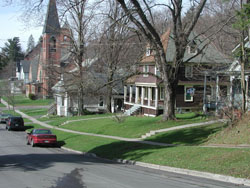Community Planning
Programs ♦ Projects ♦ Development Strategy ♦ Plans and Studies ♦ Data, Maps, and Surveys ♦ Tools, Links, and Resources
The Development Patterns Chapter (1.66 MB) of the Tompkins County Comprehensive Plan states that
Tompkins County should be a place where new development is focused in compact, walkable, mixed-use communities.
It is the policy of Tompkins County to:
- Strengthen downtowns as retail, service, employment, and community centers.
- Encourage municipalities to protect rural character and scenic resources by limiting sprawl.
- Promote more housing and mixed-use development in Development Focus Areas.
- Support land use policies and regulations and public infrastructure improvements to encourage private investment in the Development Focus Areas.
- Preserve and enhance the distinct identities and historic character of existing communities.
Programs
Municipal Grants and Assistance
A number of opportunities are available to municipalities through the Tompkins County Department of Planning and Sustainability.
- Business Energy Advisors (BEA) Program (municipal buildings eligible)
- Natural Infrastructure Capital Program
- Housing Affordability and Supportive Infrastructure Grant Program - 2024 funding round opens March 18
- Municipal Parks and Trails Grant Program - deadline extended! Applications accepted May 21 through June 18 at 5:00 PM.
- Consultant list (for planning services as well as housing and infrastructure grant assistance)
Applications for the Housing Affordability and Parks and Trails programs must be submitted, along with all attachments, through the Common Grant Application. Visit the Common Grant Application website to sign up for an account and start an application. This introductory video explains how to use the application portal.
County Development Review
NYS General Municipal Law (§239 l, m & n) requires that communities in Tompkins County refer certain development applications, proposed zoning changes, and comprehensive plans to the Tompkins County Department of Planning and Sustainability for review, comment, and recommendations before taking final action.
The Tompkins County 239 Review Guide (May 2021), and its appendix, which includes the Tompkins County Energy Recommendations for New Construction (2018), are prepared by the Tompkins County Department of Planning and Sustainability. The guide was developed to provide clarity to the referral and review process required by State law. This law, commonly referred to as GML §239, was established to encourage and coordinate inter‐community and county‐wide planning and zoning decisions between local municipalities and county planning officials.
This guide consists of three sections. Section one provides an overview of the basic GML §239 legal requirements for referral, review, and the types of projects for referral. Section two provides the guiding policy documents and recommendations that are typically used by the Tompkins County Department of Planning and Sustainability during the review process. Finally, section three addresses the process used by Tompkins County to accept, review, and complete referrals.
To submit a 239 review for County review, municipalities can utilize the online submission form.
For questions on the County Development Review process, please contact the Department of Planning and Sustainability.
Incremental Development Alliance
 In 2019, Tompkins County hosted the non-profit Incremental Development Alliance for a series of public meetings and trainings with municipal staff, planning board members, and elected officials focused on incremental development and "missing middle" housing.
In 2019, Tompkins County hosted the non-profit Incremental Development Alliance for a series of public meetings and trainings with municipal staff, planning board members, and elected officials focused on incremental development and "missing middle" housing.
- June 26th Small Scale Development Seminar Flyer
- April 24th Public Presentation Flyer
- April 24th Video
- Presentation Slides
Projects
NYSDOT Maintenance Facility Redevelopment
Tompkins County and the City of Ithaca conducted a feasibility study and financial plan for the relocation of the NYSDOT Maintenance Facility (located near the Ithaca Farmers' Market). The NYSDOT site is the most prominent waterfront property in the City of Ithaca with potential for redevelopment according to both the Cayuga Lake Waterfront Plan and the Tompkins County Comprehensive Plan. The study was partially funded by the New York State Department of State with funds provided under Title 11 of the Environmental Protection Fund Act.
An Oversight Committee was established to oversee the project. Representatives from the City of Ithaca Planning Department, the Ithaca Urban Renewal Agency, the Tompkins County Department of Planning and Sustainability, the New York State Department of Transportation, and Tompkins County Area Development served as members. A team of consultants, headed by Fisher Associates, was hired to work with the Oversight Committee to prepare the required studies, plans, and analyses.
The final report is posted here (37 MB).
Completed elements of the project include a geotechnical evaluation (4.5 MB) of the site and a Phase I Environmental Site Assessment (0.4 MB).
An Open House was held at the Tompkins County Public Library to introduce the public to the project and to allow for discussion about the elements of the study. These included:
- a site plan (1.6 MB) of a possible new NYSDOT Maintenance Facility in the Village of Dryden
- three alternative scenarios (2.0 MB) for redevelopment of the Cayuga Inlet site
- preliminary fiscal analysis (13.7 MB) of those alternatives
- architectural sketches (4.4 MB) of the alternatives
Future steps at this stage of the project will include preparing:
- A financial plan for the redevelopment of the Cayuga Inlet site that reduces the risk for private developers and generates revenue to support the move of the existing NYS DOT facility.
- An analysis of the project’s impacts on infrastructure and utilities, the natural environment, neighborhood and adjacent properties, and the surrounding road network.
- An estimate of the land value of as well as the individual components of the plan. The result will be an order of magnitude valuation of the site to better understand the project’s ability to attract private investment, support debt, and support a purchase price and tax revenue stream that could be used to advance the NYS DOT facility’s relocation.
- A draft Request for Proposals (RFP) to solicit developers to redevelop the site.
- An estimate of the ongoing direct fiscal benefits to accrue to the City of Ithaca and to Tompkins County, including real property taxes, personal property taxes, school taxes, sales tax, and other applicable taxes and fees.
- A financial strategy for moving the DOT site with some combination of revenue from sale of the site, direct funding from NY State, and, possibly, a local contribution from anticipated tax revenues.
County Development Focus Area Strategy (2012)
The County Department of Planning and Sustainability has developed a strategy for Development Focus Areas, entitled Building Vibrant Communities in Tompkins County. The Strategy was endorsed by the Tompkins County Legislature October 2, 2012.
The Development Focus Areas Strategy:
- Identifies Development Focus Areas where new development should be encouraged (in short, where public water, public sewer, and transit services are already provided).
- Describes the type of development that should occur (more mixed-use development that supports transit, walking, and bicycling as viable transportation options).
- Defines, in broad terms, the steps that can be taken to support the shift away from a sprawling pattern of development to a more concentrated or nodal pattern.
The Development Focus Area Strategy presents an analysis of established Development Focus Areas (the urban center, the villages, and rural hamlets) and assesses emerging Development Focus Areas, those places where private investment in housing, jobs and services, and public investment in transportation and sewer and water infrastructure, and public facilities have already provided the basis for additional development.
While the work to prepare this strategy was undertaken by the County, its success is dependent on local governments to put into action. Without the local policies in place to make this happen, this strategy will never succeed.
Plans and Studies
Tompkins County Building Code Administration and Operations Study (2024)
Route 96 Corridor Management Study (2009)
NYS Route 13 / 366 Corridor Management Plan: Dryden, New York (2008)
Northside Waterfront Access and Circulation Study (2008)
NYS Local Waterfront Revitalization Program: Cayuga Lake Waterfront Plan (2004) (12.6 MB)
Data, Maps, and Surveys
Tompkins County Land Use and Land Cover Map
Tools, Links, and Resources
2020 Ithaca Area Economic Development Water & Sewer Study Update
